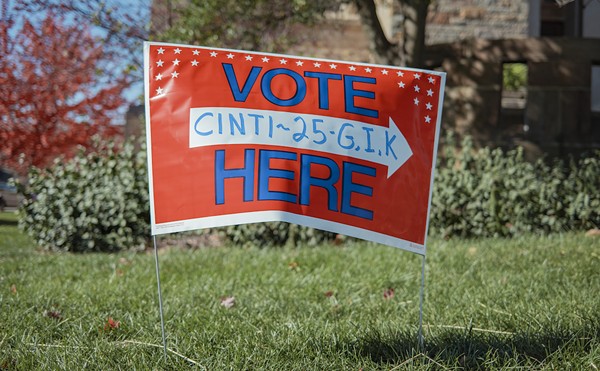Mayor John Cranley wants Cincinnati City Manager Harry Black to leave. But it won't be that simple.
After reaching an unprecedented impasse over the past two days — Cranley yesterday released a statement saying Black was leaving, and Black countered with his own saying he would stay — the mayor today laid out the process by which he would seek to remove the city manager. The path to getting Black to go still runs through city council, however, which must give approval. So far, indications have been that it is unwilling to do so.
Black says he's staying, rejecting a reported buy-out worth as much as $500,000. Cranley will also have to contend with Black's supporters, including prominent African American leaders, who believe he is being fired because he's spoken up about negative racial dynamics within the Cincinnati Police Department.
If all that sounds familiar — the dossier of wrongdoings, the testimony before council, the throngs of supporters protesting an ouster — it's because it's very similar to the run up to CPD Chief Jeffrey Blackwell's firing in 2015. Black's potential firing is just the latest in a string of tumultuous exits for high-level city officials that dates back to 2013 and which, should Black eventually take the severance, will have cost the city more than $1.2 million.
Cranley says his move isn't related to recent statements by Black about a rogue element working to take down Cincinnati Police Chief Eliot Isaac, but results from a "pattern of behavior" involving abuse and intimidation that has emerged over the years from Black. Cranley says he's given the city manager multiple chances to correct that behavior. Three lawsuits filed by city employees represented by the same attorney have alleged Black has retaliated against them.
Now, Cranley will compile a written report with statements from what he says will be roughly a dozen city employees who say they have experienced inappropriate behavior from Black. The mayor says he will also ask those employees to testify before council. Those who are afraid of retaliation can submit statements.
“I advised him to cease and desist certain behaviors," Cranley told reporters gathered in his office after today's Cincinnati City Council meeting. "Those behaviors are resurfacing and getting more egregious. I feel in good conscience I need to share this with council to decide how to move forward with the city."
All of that will be to show council that it must vote to remove Black, Cranley said. He asked Black not to make any personnel decisions as the review process he outlined proceeds over the next two weeks.
"This is sad. I brought Harry here. We did some great things together," Cranley said.
The announcement came after a tense council meeting. A number of community members, many of them black leaders, crowded into council's public comment session to air their support for Black. They included Black Agenda leader and former Cincinnati mayor Dwight Tillery, Pastor Leslie Jones and others.
It was a complicated situation as activists found themselves supporting a city manager they had once blasted for his firing of Chief Jeffrey Blackwell in 2015. Since then, however, Black has gotten better at protecting the African American community, and the path Black's dismissal is taking isn't the right approach, they said.
"We do not have an executive mayor," said NAACP Vice President Joe Mallory of Cranley's attempts to remove the city manager. Mallory mentioned he didn't support Black's firing of Chief Blackwell and didn't want the city manager to get a big payout if he was fired.
The brief meeting was somewhat chaotic. Those supporting Black were mixed in with other speakers imploring council to pause its responsible bidder program — it voted not to — and also asking the city to spend more time on its refresh of the historic Collaborative Agreement police reforms, which recent reports say have fallen by the wayside.
The Black United Front's Iris Roley wove together Black's precarious situation and strife within the city's police department and seemingly stalled attempts to refresh the city's police reforms.
"Over recent months, city manager Black has shown his commitment to the Collaborative refresh through his leadership," Roley said, likely referring to moves Black made pushing back against a request by Fraternal Order of Police President Dan Hils seeking to delay the testimony of CPD officers before the city's Citizen Complaint Authority police review board. "We support city manager Black and ask that you do as well."
Black sat silently as his defenders railed against the mayor and pledged their support for him — as long as he continued to support them by supporting police reform efforts and black leaders like CPD Chief Isaac.
The tension was thick as the meeting wrapped up. Making the usual rounds asking about announcements following voting, Cranley asked Black if he had anything to announce.
"Nothing at this time," he said.
The entire meeting was an odd spectacle. Former Cincinnati City Councilman Jim Tarbell expressed concern and blamed the city's unusual dual-executive governmental structure — not quite a strong mayor system, nor a council-city manager system.
"No, I haven't," he said when asked if he'd seen a day quite like what unfolded at City Hall today. "And it's troubling."
Following the somewhat surreal council meeting, Black remained steadfast that he would not leave until forced out.
"I'm committed to continuing to be the city manager," Black told reporters in council chambers. "The forces that are out there are going to continue to do what they've been doing."






